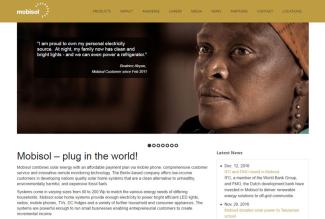Germany’s Federal Government
Promoting investments in Africa

According to German associations of industry, only about 1000 of 400,000 internationally active German private-sector companies have invested in Africa so far. This number does not match that world region’s potential. Müller calls Africa a „continent of opportunities“. The new initiative is geared to improving the investment climate and reducing risks. Gabriel says: “The need for investment in African countries is huge.” In his experience, German technology and know-how are in high demand.
The two cabinet members intend to increase trade in both directions, boosting African economies as well as the German one. Müller argues: “Jobs give people perspectives for their lives, and people who have a perspective stay in their home countries.” The initiative is designed to improve the links between German embassies, chambers of commerce and bilateral development agencies. Other aspects include giving more extensive advice to African partners and offering German investors tax incentives as well as governmental guarantees. The initiative has ten focus areas:
- improving the institutional environment in partner countries,
- actively supporting companies that invest and start development partnerships,
- promoting start-ups as well as small and medium-sized enterprises in partner countries,
- mitigating risks to facilitate more investments,
- making the guarantees that are offered by the Federal Government more attractive,
- creating tax incentives,
- promoting sustainable supply chains,
- improving options for financing investments,
- enhancing the legal context for trade within Africa as well as at the EU level and
- training skilled labour and experts.
Gabriel is particularly proud of Germany’s system of training and is keen on exporting this „crown jewel”, as he calls it. Training young people is “real-life development aid“, he says. However, leaders in developing countries tend to underestimate the relevance of vocational training.
The new initiative fits the two minister’s ambition to manage globalisation in an equitable manner. “In the past 30 years, world trade has lifted hundreds of millions of people from hunger and poverty, providing them with jobs and prosperity,” Müller says. He acknowledges, however, that the lack of market regulations has resulted in distributional challenges and problems of fairness. “As the wealthiest 10 % of humanity control 90 % of its wealth, we must reconsider the question of what kind of growth we want,“ he says. He calls for the stringent regulation of global markets as well as minimum standards concerning social and environmental matters.
In Europe, the negative impacts of globalisation have been marking public debate recently. Gabriel points out that, according to a Bertelsmann Foundation survey, 45 % of Germans consider globalisation to be dangerous. Their share is growing. The reason, he says, is that people fear a loss of control, for instance regarding migration.
Germany’s Federal Government is a proponent of international trade agreements. Müller insists: “We must ensure the World Trade Organization moves on from being a free trade regime to providing a global framework for fair trade in line with social and environmental minimum standards.” His colleague from the economics department emphasises that bilateral trade negotiations serve this purpose too. Experience shows, however, that it takes a long time to conclude trade agreements, and things are unlikely to become easier after Donald Trump was elected US president and Britain has opted to leave the EU. “Global rules matter very much,” Gabriel says, but he admits that bringing them about is a huge challenge.
Both ministers agree that development policies and foreign-trade policies must be mutually reinforcing. Their new initiative is meant to show how that can be done.
Theresa Krinninger






